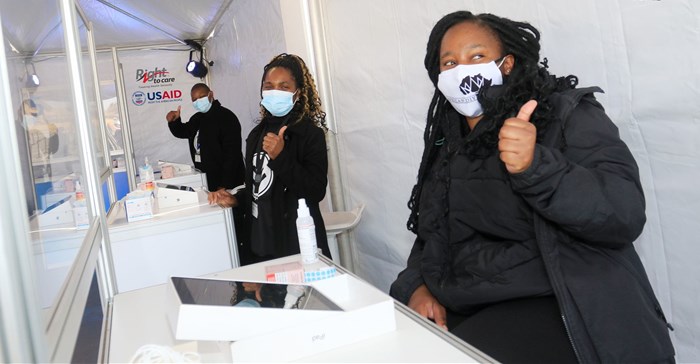Over 18-million vaccines administered save over 47,700 lives

For every one-million vaccine, 2,500 deaths are prevented explains Professor Ian Sanne, CEO, Right to Care, the health NGO that with support from USAID, put a team together including international experts, and in May, began supporting the National Department of Health (NDoH) to ramp up the vaccinations.
“Average monthly doses administered have doubled since the start of the national vaccination rollout programme,” says Sanne.
There are currently over 1,800 vaccine sites across the private and public sectors. The overarching target is 2,500 vaccine sites and 70-million doses by February 2022.
A big data platform
The EVDS is a centralised web-based solution designed for the capturing of all vaccination events at all sites and is supported by extensive data analytics (a ‘big data platform’) to monitor, plan and report.
It was developed and initially set up by the NDoH for the J&J Sisonke study earlier this year when almost 400,000 front-line healthcare workers were vaccinated ahead of the general population.
The EVDS allows every vaccine decision to be informed by real-time data and ensures that citizens vaccinated with the first Pfizer dose receive their second dose in time.
A R20bn a year business
In financial terms, the EVDS is the equivalent of a R20bn a year business.
“The operationalisation of this system in a short time frame is the fastest business build of its size in the history of South Africa,” he says
“A team of 40 dedicated people from Right to Care and the NDOH are running the project. By way of comparison, in the UK, a team of 1,000 consultants implemented a similar project for a population only 10% larger than South Africa’s,” he adds.
Informing the vaccination process
The EVDS is central to balancing the demands of the vaccine rollout.
It maintains centralised control of vaccine inventory to prevent vaccination sites from hoarding doses; it helps close the gap between doses available and doses administered; and it ensures that vaccines are distributed and administered fairly across population groups and in rural and urban areas.
Geographic information systems and geo-analytics support the planning and rollout.
“The EVDS monitors every dose arriving in the country all the way through to a patient’s arm, so we know where every vaccine goes,” says Sanne.
“It manages the scheduling of vaccine sites so they are not flooded by people arriving in the morning but are rather spread out during the day.
“It makes sure that no one gets left behind giving access to vaccines by all population groups in rural and urban areas.
“It ensures that the correct supply goes to the correct site at the right time. Timing is critical because of the cold chain requirements of the vaccines. It also minimises stock wastage,” he explains.
Encouraging vaccination
The process was designed to be efficient to encourage the population to vaccinate.
“The EVDS tells us where there is vaccine hesitancy and where our communication efforts need to be directed.”
Vaccination sites include private and public hospitals, pharmacies, general practitioners’ rooms, and occupational health and safety sites in key sectors like mining, automotive, retail and power.
“Discovery Health’s vaccination site at Gallagher Estate is an excellent example of how the private sector is working with the government to increase vaccine take up with capacity for 3,800 vaccines a day. Public facilities have also embraced the programme to ensure programme success,” Sanne says.
“This system has been designed specifically for Covid-19 vaccinations, but it can be adopted for future vaccinations and other health programmes.
Working with the Department and through the support of USAID, we have a highly advanced vaccination system that can be adopted anywhere in the world,” he says.























